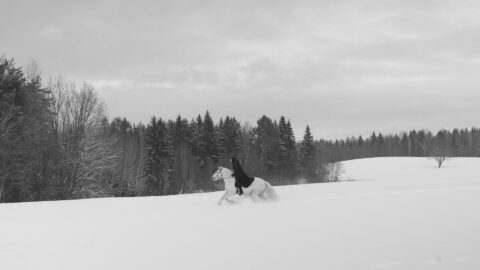International feature film competition entry Mother Vera (Marie-Cecile Embleton, Alys Tomlinson, 2023) started as Ex-Voto (2019), a series of large-format black and white photos taken by Tomlinson at pilgrimage sites across Ireland, Poland and France. One nun in particular, the eponymous Vera, formerly known as Olga, lingered long in her mind. The resultant film, almost six years in the making, follows her life as an Orthodox nun in a remote location in Belarus. Entering the faith several years ago as a response to her boyfriend Oleg’s imprisonment, as well as a way to battle her own drug addiction, the final result is a tender, visually striking and hard-wrought tale of personal salvation — both within and without the Church.
It’s shot in austere black-and-white, bringing to mind the nunnery tale of Ida (Paweł Pawlikowski, 2013), the films of Bela Tarr, and classic Soviet cinema: bare pine trees evoking Ivan’s Childhood (Andrei Tarkovsky, 1962) and endless shots of snow reminiscent of The Ascent (Larisa Shepitko, 1977). The stark black nun habit contrasted against the pure white of the surrounding wintry countryside sharpens the senses, highlighting Olga’s struggle against the forces of mental evil while striving for mental clarity.
I went to a school run by monks, and perhaps for some of them, judging by their too-personal sermons, adopting the monastic way of life was more of a solution for inner turmoil — drugs, alcohol, mental health issues — than about finding God. I got a sense that for Olga, God is more of an internal solution than a matter of faith. God, whoever that is, is a metaphor.
Olga speaks frankly about her struggle with heroin, how at first it offered a balm and a sense of transcendence, before its real ugly face revealed itself. With the routine offered by the Church, and faith’s invocation to surrender to a higher power (itself a core tenet of the Anonymous sobriety programmes), willingly living in a proscribed fashion gives her the chance to slowly rebuild her life.
A core part of that is dedicating her life to others. The nunnery is not only home to various animals, such as horses and donkeys, which she forms a deep and intimate connection with, but also wayward men — ex-convicts, drug and alcohol addicts. In a fantastic group scene reminiscent of a Frederick Wiseman film, a priest schools the prison mentality among these older men as they ostracise a downtrodden sexual assault survivor that they consider somehow tainted. This is as close as this Belarus-set film comes to the political, otherwise skirting knotty questions of limited social services in an authoritarian state in favour of a tale of emotional growth.
The filmmakers find a formal solution to its question of personal freedom as the black-and-white slowly gives way to colour, taking away the hitherto porcelain smoothness of Olga’s skin and revealing her lived-in wrinkles. (Vera isn’t so little anymore!) Entering a nunnery might pose a simple solution to a complex problem, but the harder part is knowing what to do when you finally want to leave. Replacing one habit with another is hard. Breaking out of them altogether is another matter entirely.
Redmond is the editor-in-chief of Journey Into Cinema.





